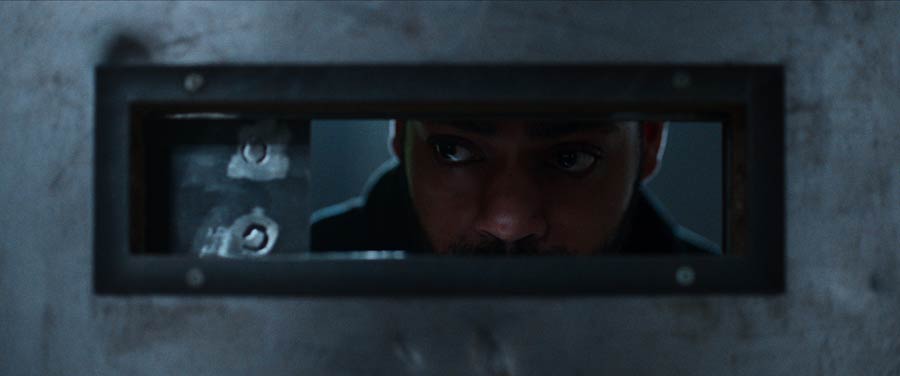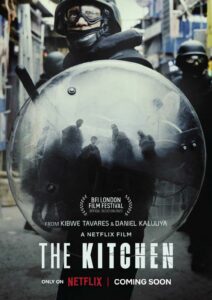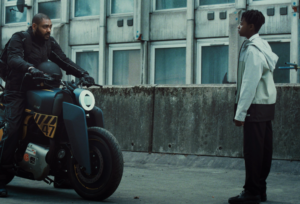Directed by Daniel Kaluuya and Kibwe Tavares | Written by Kaluuya, Joe Murtagh, and Amy Baty | 107 min | ▲▲△△△ | Netflix
Acting powerhouse Daniel Kaluuya steps behind the camera to co-direct this moody, well-shot picture boasting a set of solid performances and an impressive construction of a plausible future dystopia. What it isn’t, despite what unhelpful summaries online might tell you, is a thriller, or even especially plot-driven. This is an earnest, kitchen-sink social drama set in the near future that never quite gets on its feet.
Izi (Kane “Kano” Robinson) is a man without a community. He lives in the Kitchen of the title, a brutalist tower that looks like a council estate. It turns out the people there have been forced out of London and are squatting, with the threat of the police coming to the door ever present but an encouraging voice giving them all support over the radio, Ian Wright’s Lord Kitchener.
Izi’s plan is to raise enough money from his straight job as a worker drone offering custom eco burials to get into a condo and out of the Kitchen, which he calls a shithole. That’s when Benji (Jedaiah Bannerman) shows up, a teen who’s just lost his mother and is looking for his father — Izi’s the likely candidate.
Izi, however, was raised without any support and never even knew his mother. Accordingly, he’s a poor choice of father figure for young Benji and while is up for showing a little kindness to the kid he isn’t reliable. Benji might have better luck finding a family with a group of badasses led by Staples (Hope Ikpoku Jnr), though the price he’d pay would be an entrance to a world of violence.
And that’s pretty much it for the first two acts — the forward momentum slows to a crawl as Benji bounces between bad communicator Izi and friendly but dangerous Staples. The surfeit of inarticulate men and too few relatable women might be part of the problem, but it’s really the script that’s undercooked: after 20 minutes of set-up we get an hour when nothing happens. Izi and Benji get to know each other better, but it’s not enough to hold the interest and suspense or real jeopardy never really manifests.
The locations — the film was shot in north London and Paris — do some heavy lifting to at least keep the future world believable, and the sets and small details help like the way Benji is able to visualize his potential haircuts, as well as the deep alienation of Izi’s experience at an automated booth at the bank. As Izi and Benji, Kano and Bannermann do the work to make us care.
But there’s little about the thematic thrust that feels like it requires the sci-fi treatment — this could’ve been set today in any marginalized, economically downtrodden community in a major urban centre in the world. Benji does end up in Staples’ crew with a mission to steal from wealthy London retail — we get a fun scene of motorcycles riding up the Burlington Arcade — but by then it’s too little too late. We’re never really in doubt about where Benji’s loyalties lie because Izi never has to fight Staples for them, just his own nature, while Benji’s character arc ends up being both too brief and a little exhausting.












